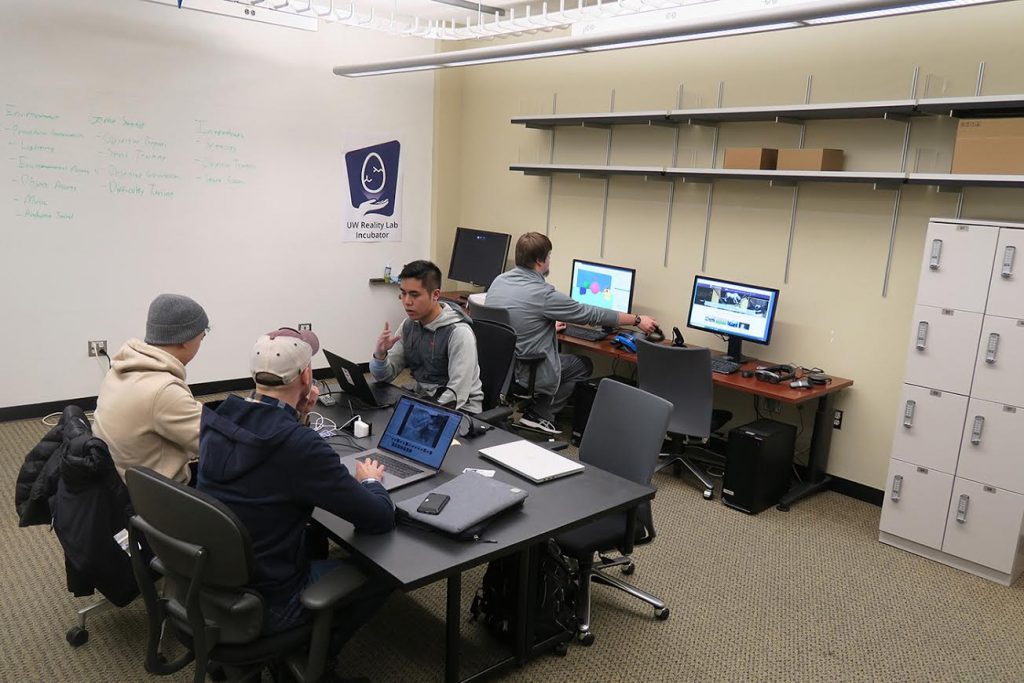
The UW Reality Lab has launched a new incubator where students can develop innovative projects in augmented and virtual reality (AR/VR) with guidance and resources from lab faculty and staff. The Reality Lab, which launched two years ago, allows researchers to focus on the pursuit of leading-edge research and educating the next generation of innovators in this growing field. The incubator gives students a space to work on AR/VR projects while fostering a community of collaboration and organic mentorship. It also supports the greater UW community in AR/VR research and allows the novel research taking place in the incubator to be shared with the whole world.
“We select projects and teams for the incubator with the goal of having every project ultimately be released to the community in the form of research results or an application,” said John Akers, director of research and education in the lab. “Projects can either be in support of other groups in the greater UW community, such as other labs and departments, or student motivated projects based on ideas they are committed to developing fully.”
According to Ira Kemelmacher, professor of computer science and director of the UW Reality, Lab, one of the biggest challenges in AR/VR adoption is content and experiences creation.
“We are opening the incubator to allow undergraduate researchers to team up, come up with fresh ideas, and invent the future of AR/VR. We started by teaching a series of AR/VR capstones where teams of students came up with application ideas and implementations, in an amazing variety of fields from visualization of homelessness to cooking in AR,” she said. “In capstones they only have 10 weeks to bring their ideas into life. Due to its high popularity in the undergrad community and successful results, we decided to open an incubator that will allow more time for development. We believe undergrads have an immense potential in creating breakthroughs in AR/VR technology and our incubator encourages them to do exactly that, while getting advising, state of the art hardware, and full support from us and our collaborators.”
At the moment, the incubator is hosting two projects. One is led by Max Needle, a Ph.D. student in the Department of Earth and Space Sciences. Needle’s research is in rocks bending. He flew a drone around a strip mine in Pennsylvania that features a large folded rock layer, as well as several fossils and lots of faults. He was then able to generate a high-resolution 3D model of the mine from the drone photos, with the goal of developing immersive geological adventure and educational experiences.

“The strip mine is a field-trip destination for many university geology classes, however, like many exquisite exposures of geologic structures, there are geographical and physical limiting factors,” Needle said. “To overcome obstacles related to access, my group at the Reality Lab Incubator is developing a virtual field trip through the strip mine. The geology-specific tools that we develop for VR with the Reality Lab, as well as the format and gameplay, can be put in a pipeline to enhance VR experiences of other geologic sites that have been mapped digitally in 3D.
His work will open new doors for teaching geology, and who has access to field geology.
“The incubator is great, so far,” said Andrew Wang, a second year Allen School student working with Needle. “All of the necessary tools are available. Having these tools so accessible will help us debug and further develop our knowledge in VR/AR technology.”
The other active incubator project is led by an Allen School senior and explores how different forms of locomotion mechanics in virtual reality can create emergent gameplay. He is working to see if some of these modes could reduce the simulator sickness some people feel in VR.
According to Akers, the incubator hopes to increase projects in the future as the process process for how projects are accepted and teams are composed is solidified. Learn more about the incubator and how to get involved on their website.

